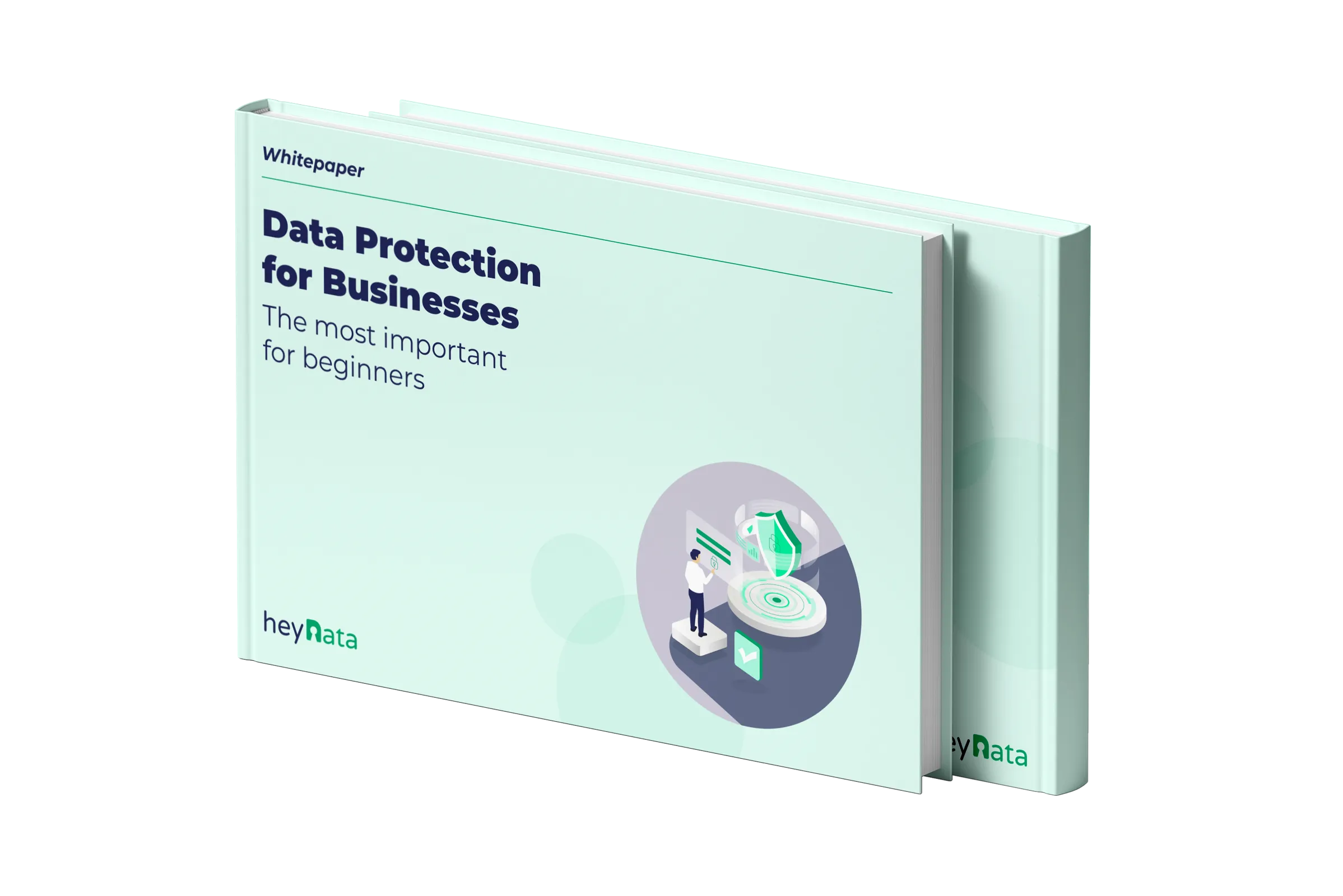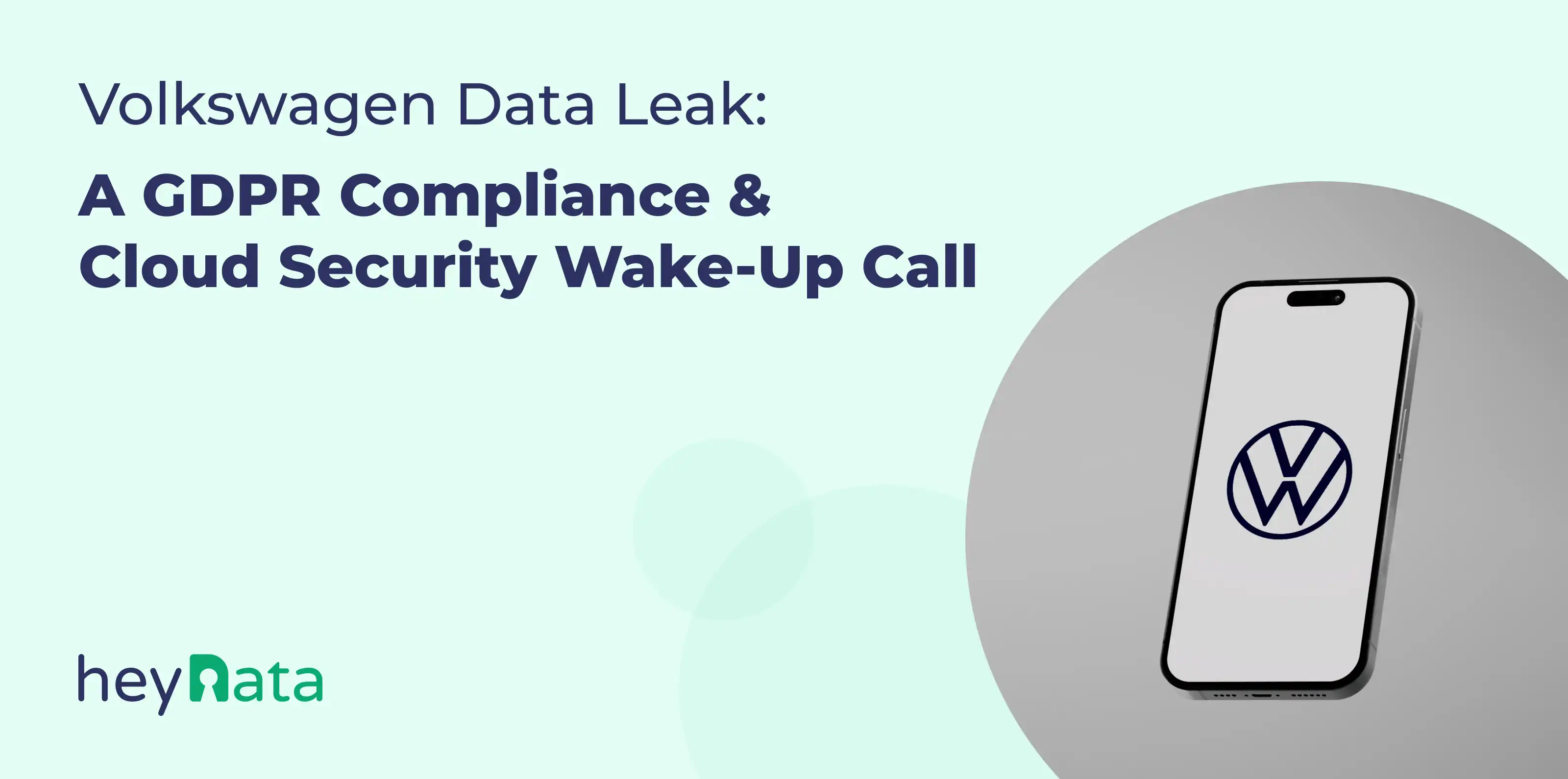
After the VW data leak
Get your data protection right!

Volkswagen Data Leak: A GDPR Compliance & Cloud Security Wake-Up Call
In December 2024, Volkswagen’s software subsidiary, Cariad, suffered a major data breach that left unprotected information from approximately 800,000 electric vehicles exposed on an Amazon cloud service for months.
The breach, which was due to a misconfigured cloud storage setting, granted unauthorized access to sensitive data, including precise GPS location history, vehicle status, and potentially even owner contact details.
This incident underscores the increasing risks of cloud-based data storage, particularly when mismanagement or human error leaves vast amounts of sensitive information vulnerable to cybercriminals.
Given Volkswagen’s prominence in the automotive industry and the growing importance of connected car technology, the breach raises serious concerns about data protection, regulatory compliance, and GDPR violations.
Table of Contents:
The Risks of Cloud-Based Data Storage
Cloud storage has revolutionized data management, offering scalability, accessibility, and cost-effectiveness. However, it also presents significant security risks, especially when cloud configurations are mishandled.
The security risks can be caused by:
- Access Control Misconfigurations: Incorrectly set permissions or settings can expose sensitive data to unauthorized access, serving as a critical entry point for hackers.
- Unencrypted Data Exposure: Storing unencrypted data increases the likelihood of breaches. If sensitive information is not adequately protected, it becomes susceptible to interception during transmission or unauthorized access while at rest.
A single misstep—such as failing to implement strict access controls or properly encrypting stored data—can expose millions of records to unauthorized access.
The Volkswagen data leak is not an isolated incident. In recent years, several high-profile data breaches have resulted from cloud misconfigurations, demonstrating how prevalent these risks are:
- Alibaba (July 2022): A misconfigured Alibaba Cloud database exposed the personal data of over one billion Chinese citizens. The breach, which stemmed from insufficient security settings, highlighted the dangers of poor cloud infrastructure management.
- AT&T (January 2023): Sensitive customer data, including call records and text logs of 109 million users, was leaked due to a vulnerability in a third-party cloud vendor’s security protocols.
These cases illustrate how critical it is for companies to implement strong security measures when using cloud storage, as even a minor oversight can lead to massive data breaches.
GDPR Implications: Where Did Volkswagen Go Wrong?
Under the GDPR, companies handling European users’ data must ensure strict data protection policies. The Volkswagen data leak raises several compliance concerns:
- Failure to Protect Personal Data: GDPR mandates that businesses must implement "appropriate technical and organizational measures" to safeguard user data. Exposing unprotected vehicle and personal information in a public cloud environment suggests non-compliance with this requirement.
- Lack of Consent Management: Obtaining user consent for data collection and processing is a fundamental principle of the GDPR. In the case of Volkswagen, it remains unclear whether users were adequately informed and gave explicit consent for their data to be stored in a public cloud. This lack of transparency could potentially result in legal repercussions.
- Data Minimization and Purpose Limitation: Another principle of the GDPR is that companies should only collect and retain the minimum amount of personal data necessary for a specific purpose. By storing vast amounts of customer data, including personal information and vehicle details, in a public cloud environment, Volkswagen may have violated this principle.
- Vendor Risk Management: The fact that this data was exposed on Amazon's cloud service suggests a possible failure in third-party vendor security assessments. GDPR obligates businesses to ensure that their processors (e.g., cloud providers) follow strict data protection measures.
- Breach Notification Obligations: GDPR requires companies to notify authorities and affected individuals of data breaches within 72 hours if the breach is likely to result in harm. Any delays in Volkswagen's response could lead to regulatory scrutiny.
- Data Protection by Design: GDPR’s “privacy by design” principle mandates that companies proactively incorporate data protection measures into their systems and services. A misconfigured cloud server contradicts this fundamental rule.
If found in violation, Volkswagen could face substantial fines—up to €20 million or 4% of its global annual turnover, whichever is higher. The incident serves as a warning to all businesses operating under GDPR: failure to secure customer data can have severe legal and financial repercussions.
How Companies Can Prevent Similar Breaches
In light of Volkswagen's data leak, companies must prioritize cloud security to prevent data leaks like Volkswagen’s.
Here are some essential steps businesses can take:
- Conduct Regular Security Audits: Routine audits help identify vulnerabilities in cloud infrastructure before cybercriminals do. Companies should perform penetration testing and compliance assessments to ensure systems remain secure. If you don't know where to start, we are ready to help you identify gaps and improve compliance with data protection regulations in 4 simple steps.
- Implement Strong Encryption: Encrypting data at rest and in transit ensures that even if unauthorized users gain access, the information remains indecipherable. Companies should employ end-to-end encryption for all sensitive data.
- Enforce Strict Access Controls: Businesses should adopt a Zero-Trust security model, granting users the least amount of access necessary for their roles. Multi-factor authentication (MFA) should be mandatory for cloud accounts.
- Utilize Automated Monitoring Tools: AI-driven security solutions can detect anomalies and alert administrators about potential breaches in real time. These tools help identify unauthorized access attempts and data exfiltration early.
- Train Employees on Cybersecurity Best Practices: Human error remains a leading cause of data breaches. Conducting regular cybersecurity training ensures that employees are aware of security risks and know how to handle sensitive information properly.
- Strengthen Vendor Risk Management: Many data breaches, including Volkswagen’s, stem from misconfigurations or security lapses in third-party services. Companies must thoroughly vet their vendors to ensure they comply with GDPR. Leverage Vendor Risk Management tools to quickly and reliably check providers for compliance.
By implementing these comprehensive measures, organizations can mitigate risks associated with cloud storage and prevent incidents like Volkswagen’s data breach.
Related blog: How to avoid expensive data breaches: Data security for SMEs
Broader Industry Implications and Future Outlook
The Volkswagen data leak is part of a larger trend of cybersecurity challenges affecting the automotive and IoT industries. As vehicles become increasingly connected and autonomous, the amount of data they generate and transmit grows exponentially, making them prime targets for cyberattacks.
These trends are likely to result in broader industry implications, such as:
- Stricter Regulatory Scrutiny: Governments and regulatory bodies may impose stricter security requirements for connected car data. The Volkswagen data leak may push regulators to introduce new compliance measures, requiring automakers to adopt higher cybersecurity standards.
- The Rise of AI and Automation in Cybersecurity: Companies are increasingly turning to artificial intelligence (AI) and machine learning to detect and prevent data breaches. Automated systems can identify unusual network activity, flag vulnerabilities, and respond to security incidents in real time.
- Future of Automotive Cybersecurity: As self-driving and connected vehicle technology advances, cybersecurity will become a core component of automotive design. Automakers will need to integrate secure-by-design principles into their software and hardware development processes to prevent future breaches.
- Increased Demand for Cyber Insurance: With cyber threats on the rise, more companies are investing in cyber insurance policies to mitigate financial risks associated with data breaches. Insurers may also begin imposing stricter security compliance requirements on businesses seeking coverage.

After the VW data leak
Get your data protection right!
Conclusion: The Need for Proactive Data Protection
The Volkswagen data leak serves as a stark reminder that even industry leaders can fall short in protecting sensitive data. As cloud technology continues to evolve, so do the risks associated with poor security practices. Businesses must proactively implement rigorous data protection measures, adhere to compliance regulations like GDPR, and remain transparent with consumers about cybersecurity efforts.
Data protection is a shared responsibility. By adopting strong security practices and anticipating future challenges, businesses can protect sensitive information and prevent future data breaches from causing widespread harm.
If you want to simplify compliance and ensure your business stays ahead of regulations, contact us to learn more about our All-in-One Compliance solution.
Important: The content of this article is for informational purposes only and does not constitute legal advice. The information provided here is no substitute for personalized legal advice from a data protection officer or an attorney. We do not guarantee that the information provided is up to date, complete, or accurate. Any actions taken on the basis of the information contained in this article are at your own risk. We recommend that you always consult a data protection officer or an attorney with any legal questions or problems.


